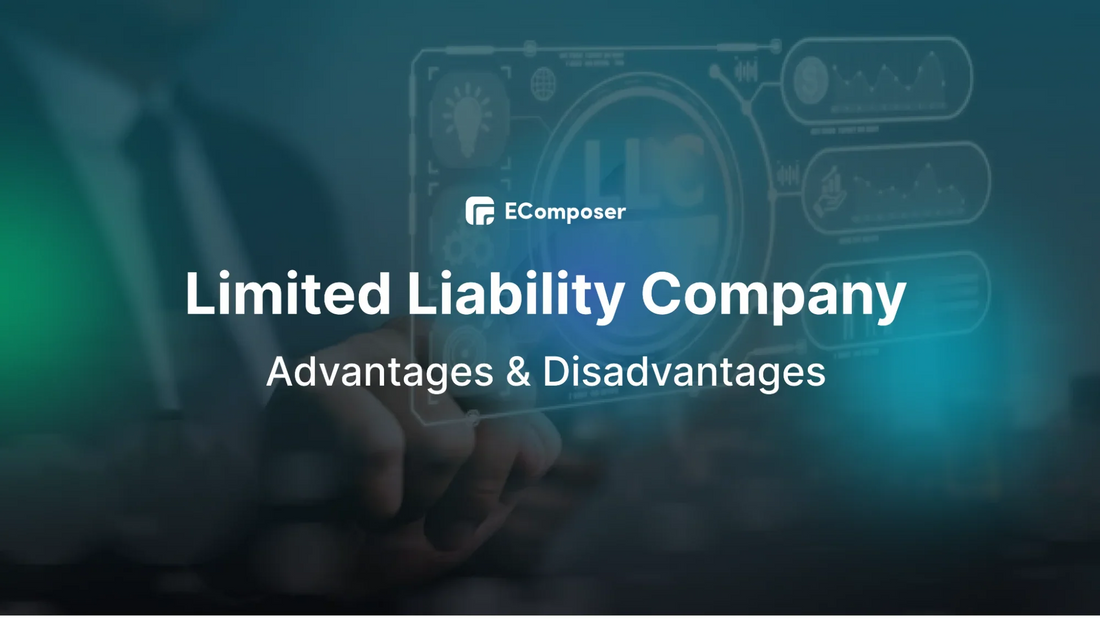12+ Advantages & Disadvantages of Limited Liability Company

Table Of Contents
Knowing clearly the advantages and disadvantages of forming a Limited Liability Company (LLC) is crucial. Join us as we navigate through the perks and pitfalls of this popular business structure; from safeguarding personal assets to navigating tax complexities, we delve into its key facets and help you make informed decisions for your entrepreneurial journey.
What is a Limited Liability Company (LLC)?

A Limited Liability Company (LLC) is a type o business structure that combines the tax benefits and flexibility of a sole proprietorship or partnership with the limited liability protection of a corporation. An LLC's members are its owners, and they are not held personally responsible for the debts or obligations of the business.
This means that their personal assets are typically protected in case of lawsuits or the business's financial obligations. LLCs offer flexibility in management structure, taxation options, and operational procedures, making them popular for small to medium-sized businesses across various industries.
Advantages of Limited Liability Company (LLC)

Limited Liability Protection
Limited liability protection to owners (members) is one of the primary benefits of an LLC. This means that members' assets are typically shielded from the debts and liabilities of the company. In case of lawsuits or financial obligations, members' assets, such as homes, cars, and savings, are generally not at risk.
Pass-Through Taxation
LLCs typically enjoy pass-through taxation, meaning the company's profits and losses are passed through to the individual members' tax returns. This avoids the double taxation often associated with corporations, where the company and its shareholders are taxed separately. Members of LLCs may save money on taxes thanks to pass-through taxation.
Flexibility in Management
Unlike corporations with a more rigid management structure with a BOD and officers, LLCs offer flexibility in management. Members can manage the company themselves or appoint managers to handle day-to-day operations. This flexibility allows for more autonomy and customization in decision-making processes.
Simplified Administrative Requirements
LLCs generally have fewer administrative requirements and formalities compared to corporations. There is typically no need for annual shareholder meetings or extensive record-keeping. Small businesses can benefit from this by saving time and money and having more time to concentrate on managing and expanding their operations.
Enhance Credibility
Operating as an LLC can enhance the credibility and professionalism of a business. Many consumers, vendors, and partners prefer to work with companies that have the added layer of limited liability protection. Registering as an LLC may also instill trust and confidence in potential investors or lenders.
Perpetual Existence
In many jurisdictions, LLCs have perpetual existence, meaning that the company can continue to exist regardless of ownership changes or individual members' departure. This provides stability and longevity to the business, allowing for smoother transitions in the event of changes in ownership or management.
Disadvantages of Limited Liability Company (LLC)

Self-Employment Taxes
While LLCs offer pass-through taxation, this can also result in members being subject to self-employment taxes on their share of the company's profits. Unlike employees of corporations who have certain taxes withheld from their paychecks, LLC members are responsible for paying self-employment taxes, including the employee and employer portions of Social Security and Medicare taxes.
Complexity in Formation
LLCs generally have fewer administrative requirements than corporations; forming an LLC can still be more complex and costly than operating as a sole proprietorship or partnership. Depending on the jurisdiction, forming an LLC may involve filing articles of organization, drafting an operating agreement, obtaining necessary permits or licenses, and paying filing fees.
Limited Raising of Capital
Unlike corporations, which are able to raise money from investors by issuing stock, LLCs have more limited options for raising funds. While members can invest additional capital into the business, attracting outside investors or issuing equity stakes to employees may be more challenging due to the lack of traditional stock options.
State-specific Regulations
LLCs are subject to state-specific regulations, and there can be substantial differences in the rules and regulations between states.. This can add complexity and administrative burden, especially for LLCs operating in multiple states or planning to expand their business operations across state lines.
Potential Conflicts Among Members
In multi-member LLCs, disagreements or conflicts among members can arise over decision-making, profit distribution, or management responsibilities. Without a clear operating agreement or dispute resolution mechanisms in place, such conflicts can disrupt the operations of the business and strain relationships among members.
Limited Life Span
While many LLCs have perpetual existence, some jurisdictions may require LLCs to specify a limited duration or dissolve upon certain events, such as the death or withdrawal of a member. This limited lifespan can introduce uncertainty and complexity, especially if the business depends heavily on the involvement of specific individuals.
Who should form a Limited Liability Company (LLC)?

People who are starting or running a business, particularly sole proprietors concerned with personal liability, professionals needing liability protection, and property owners seeking asset protection, should consider forming an LLC.
- Business owners looking for personal liability protection: An LLC shields your personal assets from business debts and lawsuits. Your house, car, and other personal belongings are generally safe, even if your business encounters financial difficulties.
- Multi-owner businesses: LLCs are flexible and can be structured to accommodate multiple owners with different profit-sharing agreements and management roles.
- Businesses with moderate income: LLCs avoid double taxation, meaning the business doesn't pay corporate income tax, and profits/losses "pass-through" to the owners' personal tax returns. This can be advantageous for businesses with moderate income.
How to form a Limited Liability Company (LLC)

Establish a Limited Liability Company (LLC) involves the following key stages:
- Choose a Name: Select a unique and available business name for your LLC that complies with naming requirements. Typically, the name must include "Limited Liability Company" or an abbreviation like "LLC."
- File Articles of Organization: Prepare the Articles of Organization and submit them to the relevant state office - typically the Secretary of State's office. This document contains important information about your LLC, including its name, address, goals, registered agent, and management structure.
- Appoint a Registered Agent: Choose a registered agent who will maintain a physical address in the state where your LLC was established. On behalf of the LLC, official letters and legal papers are received by the registered agent.
- Create an Operating Agreement: While not always required by law, drafting an Operating Agreement is highly recommended for LLCs. This document outlines the ownership structure, management roles, voting rights, profit-sharing arrangements, and operating procedures of the LLC. It helps prevent member misunderstandings and clarifies how the business will be managed.
- Obtain Necessary Permits and Licenses: To operate legally, you might need to secure federal, state, or municipal permissions and licenses, depending on your business's operations and location. Verify compliance by researching the specifications unique to your location and industry.
- File for an Employer Identification Number (EIN): Contact the Internal Revenue Service (IRS) to obtain an EIN. When employing staff, opening bank accounts, filing tax returns, and for tax purposes, your LLC is identified by this special nine-digit number.
- Comply with Ongoing Requirements: After forming your LLC, you must fulfill ongoing compliance requirements, such as filing annual reports, paying taxes, maintaining accurate financial records, and renewing licenses and permits.
- Consider Professional Assistance: Although it is legally possible to organize an LLC on your own, consulting with legal and financial experts, such as accountants and attorneys, may help you make sure you follow all legal criteria and make the best decisions for your company.
Final thoughts
In conclusion, exploring the advantages and disadvantages of a Limited Liability Company (LLC) unveils a nuanced perspective on business ownership. While the protective shield of limited liability, flexibility in management, and pass-through taxation make LLCs an appealing choice for many entrepreneurs, they also come with challenges.
FAQs - Limited Liability Company (LLC)

1. What is a Limited Liability Company (LLC)?
Answer: A Limited Liability Company (LLC) is a type of business organization that gives its owners (members) the flexibility and tax advantages of a sole proprietorship or partnership, but with limited liability protection.
2. What are the benefits of forming an LLC?
Answer: Advantages include limited personal liability, pass-through taxation, flexibility in management, simplified administrative requirements, enhanced credibility, and perpetual existence.
3. Who should consider forming an LLC?
Answer: Anyone starting or running a business, especially sole proprietors concerned with limiting personal liability, professionals requiring liability protection, and property owners seeking asset protection.
4. What are the disadvantages of an LLC?
Answer: Disadvantages include potential self-employment taxes, complexity in formation, limited raising of capital, state-specific regulations, conflicts among members, and limited life span in some jurisdictions.
5. How do I form an LLC?
Answer: Forming an LLC involves choosing a name, filing Articles of Organization, appointing a registered agent, creating an Operating Agreement, obtaining necessary permits and licenses, applying for an Employer Identification Number (EIN), and complying with ongoing requirements.
6. Do I need an Operating Agreement for my LLC?
Answer: While not always required by law, having an Operating Agreement is highly recommended. It outlines ownership, management, and operational procedures, helping prevent disputes and clarifying business operations.
7. What taxes do LLCs pay?
Answer: LLCs typically enjoy pass-through taxation, where profits and losses are passed through to the individual members' tax returns. Members are responsible for paying self-employment taxes on their share of profits.
8. Can an LLC raise capital through investors?
Answer: While LLCs can raise capital through member contributions, attracting outside investors or issuing equity stakes may be challenging due to the lack of traditional stock options associated with corporations.
9. Can I convert my existing business into an LLC?
Answer: Yes, it's possible to convert a sole proprietorship, partnership, or corporation into an LLC. However, the process and requirements vary depending on the state and the type of business structure.
10. How do I dissolve an LLC?
Answer: If applicable, follow the dissolution procedures outlined in your state's laws and your LLC's Operating Agreement to dissolve an LLC. This typically involves filing dissolution paperwork with the state, settling debts and obligations, and notifying creditors and stakeholders.
Others also read
- Advantages and Disadvantages Of E-commerce
- Advantages and Disadvantages of Social Media for Business
- Advantages And Disadvantages Of Social Media Marketing
- Advantages and Disadvantages Of Corporation: Right Move?
- 14+ Must-Know Advantages & Disadvantages of Outsourcing
- Advantages & Disadvantages of Franchising
- 16 Advantages and Disadvantages of Credit Card 2024
- 20+ Advantages & Disadvantages of Artificial Intelligence (AI)
- Top 18 Advantages And Disadvantages of Globalization























0 comments